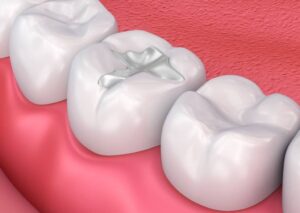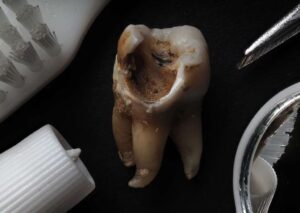If your braces hurt, especially during the first week, you’re not alone. Braces pain is completely normal—but that doesn’t mean you need to suffer through it. At Fresh Dental Care, we help patients manage braces pain effectively using both science-backed techniques and comfort-focused care.
Why Do Braces Hurt in the First Place?
The pain you feel when wearing braces isn’t random—there’s a clear biological reason behind it.
Braces work by applying continuous, gentle pressure to shift your teeth into a straighter position over time. This pressure causes the ligaments surrounding your teeth to stretch and compress, which can inflame the surrounding nerves and tissues.
This inflammation is what leads to the aching, sore sensation commonly felt in the first few days after getting braces or following adjustment appointments. Some people even experience radiating pain into the jaw or mild headaches, especially during the first week.
It’s Not Damage – It’s Progress
It’s important to remember that this pain is a normal part of the process. It means your braces are actively doing their job—remodelling the bone and guiding your teeth into a healthier, more aligned position.
How Long Does Braces Pain Last?

Understanding the typical braces pain timeline can help reduce anxiety and prepare you for what to expect. Pain from braces is usually temporary, but the intensity and duration can vary depending on whether you’re getting your braces on for the first time or attending a routine tightening appointment.
Day 1: The Moment They’re Put On
Right after your braces are installed, you might not feel anything immediately. But within a few hours, pressure builds, and your teeth may start to feel sore or sensitive. Many patients report a dull ache or tightness by the end of the day.
This is completely normal—your teeth are just beginning to move.
Days 2 – 3: The Peak of Soreness
This is typically when pain reaches its peak. The second and third day after your braces are placed or tightened are often the most uncomfortable. Eating solid food may feel challenging, and your jaw might feel fatigued.
This is a good time to stick to a soft diet, manage pain with over-the-counter medication, and apply a cold compress to ease soreness.
Days 4 – 7: The Start of Relief
By the end of the week, your body starts adjusting to the new pressure. Most patients feel a noticeable drop in discomfort by day 5. You might still feel a bit of tightness when biting or chewing, but overall, the intense pain should start to fade.
Monthly Tightening Appointments
Every time your braces are adjusted—usually once a month—you may experience a similar cycle of soreness. However, most people find that the pain after these follow-up appointments is milder and shorter than the initial installation.
These appointments are essential to keep your treatment progressing, but they don’t usually require as much downtime or recovery.
How to Soothe Braces Pain Quickly
Braces pain can feel like pressure, aching, or soreness, especially in the first week. Thankfully, there are several proven methods to help reduce braces pain and make the experience more manageable.
Saline Solution (Salt Water Rinse)

One of the simplest home remedies is a warm salt water rinse. It helps reduce inflammation and promotes healing, especially if your gums or cheeks are irritated. Mix half a teaspoon of salt in a cup of warm water and swish gently for 30 seconds.
Do this 2-3 times a day, especially after meals.
Pain Relievers
For more intense discomfort, over-the-counter medications like paracetamol or ibuprofen can be effective. These are often considered the best pain medication for braces in the short term. Always follow the dosage instructions, and consult your dentist if you’re unsure what to take.
Avoid aspirin for younger patients as it’s not recommended for children under 16.
Cold Compress
A cold compress applied to the outside of your jaw for 10-15 minutes at a time can help numb the area and reduce inflammation. This is especially helpful during the first few days when pain peaks.
Alternatively, sipping on cold water or sucking on ice chips (without biting) can offer temporary braces pain relief from inside the mouth.
Stick to a Soft Diet
Hard or chewy foods will only aggravate the pain. Stick to soft, gentle foods like yogurt, soup, mashed potatoes, scrambled eggs, or porridge. This gives your teeth a break and minimizes pressure.
Prioritize Oral Hygiene
Braces make cleaning your teeth trickier, but skipping hygiene will only make pain worse if it leads to swollen gums or plaque buildup. Use an orthodontic toothbrush, floss threaders, and mouthwash to keep things clean and bacteria-free.
What to Do if Brackets or Wires Are Poking Your Mouth
If brackets or wires are poking your cheeks, gums, or lips, ask your dentist for orthodontic wax. This soft, moldable wax creates a smooth barrier between the metal and your mouth, reducing irritation and preventing painful sores. It’s a temporary fix, but it makes a big difference—especially in the early weeks or right after adjustments.
Gum Massage
Massaging your gums with clean fingers can improve blood flow and relax the tissues around your teeth. Use gentle circular motions, especially near the areas where the brackets are applying pressure.
This can be especially soothing at night before bed when pain tends to worsen.
What’s the Best Medication for Braces Pain?

When your braces are freshly tightened or newly placed, it’s normal to feel a dull ache or soreness. The good news? There are effective, dentist-approved medications and remedies that can help manage this pain quickly and safely.
Over-the-Counter Painkillers
For most patients, common over-the-counter (OTC) medications like paracetamol (Panadol) or ibuprofen (Nurofen) are effective in relieving discomfort. These medications reduce inflammation and provide temporary relief from soreness caused by pressure on the teeth.
Ibuprofen is especially effective during the first few days after tightening because it not only numbs pain but also reduces swelling. However, it’s not suitable for everyone – especially those with stomach issues or allergies. Always check with your dentist or pharmacist before taking any medication.
If you’re unsure which painkiller is right for you, consult a licensed dental clinic in Kepong for personalised advice.
Oral Anaesthetic Gels
If you’re experiencing localized irritation on your gums, cheeks, or tongue from bracket friction, you can apply an oral anesthetic gel such as Orajel or Bonjela. These gels numb the irritated area and can be applied multiple times a day.
They are especially helpful at night when irritation might affect your sleep.
Prescription-Strength Medications (Rarely Needed)
In rare cases where OTC medication isn’t strong enough, your dentist may prescribe a stronger anti-inflammatory or painkiller. This is generally reserved for more complex procedures like surgical orthodontics or if you’re recovering from severe gum inflammation.
However, these situations are uncommon and most braces-related pain can be managed with non-prescription methods.
Timing Your Medication
The best time to take painkillers is actually before the pain starts. For example, if you have an orthodontic appointment scheduled for tightening, consider taking a dose 30–60 minutes before your visit. This can significantly blunt the discomfort in the first few hours.
Frequently Asked Questions
What to do if a dental filling falls out?
If a dental filling falls out, it’s important to contact your dentist as soon as possible. A lost filling can leave your tooth exposed, increasing the risk of pain, sensitivity, or decay. While waiting for your appointment, avoid chewing on that side of your mouth and keep the area clean by gently rinsing with warm water. Over-the-counter pain relievers can help if the tooth is sensitive. Your dentist will usually replace the filling or recommend another restoration to protect your tooth and restore its function.
Do dental composite fillings stain over time?
Yes, dental composite fillings can stain, especially if you frequently drink coffee, tea, red wine, or smoke. However, surface stains can usually be polished off during regular check-ups. If the staining is internal or excessive, replacing the filling might be the better option.
Is the dental filling procedure painful?
Not at all. Local anesthesia is used to numb the area, so you shouldn’t feel pain during the procedure. At most, you might feel minor pressure. After the numbness wears off, some people experience mild sensitivity, but it generally goes away in a few days.
Are dental composite fillings good for front teeth?
Absolutely. In fact, dental composite fillings are one of the most recommended options for front teeth repairs because they blend so naturally with your tooth color. Their bonding strength also makes them great for minor chips and cracks.
Are there risks involved with dental composite?
Composite is generally very safe, but if done poorly, it can lead to marginal leakage or bonding failure. That’s why it’s important to get them done by a skilled dentist who knows how to properly isolate the tooth and cure each layer correctly.
Book a Dental Composite Filling Appointment With Fresh Dental Care Kepong
If you’re noticing tooth sensitivity, decay, or old fillings that need replacement, now’s the time to act. At Fresh Dental Care Kepong, we offer expert composite filling treatments using high-quality materials that match your natural teeth.
Our clinic in Kepong is known for precise, comfortable procedures, whether you’re getting your first filling or replacing an old amalgam. Plus, we provide transparent pricing and personalised care tailored to your smile.
Book your appointment now via WhatsApp or visit our clinic page to learn more about our full range of dental treatments in Kepong. Your journey to a healthier, brighter smile starts here.





